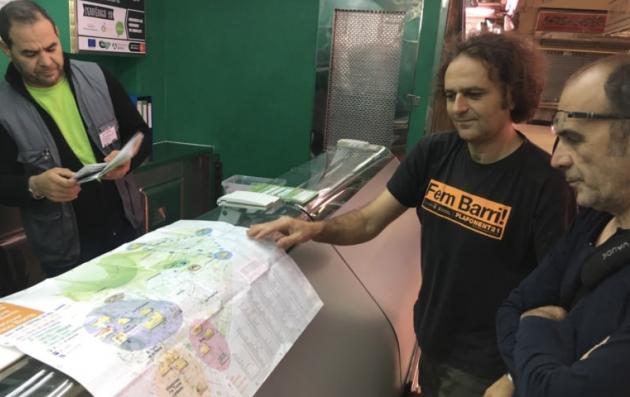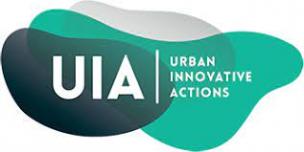Summary
The B-MINCOME, combining a minimum guaranteed income with active social policies in deprived urban areas of Barcelona, is a pilot project that aims to fight poverty and social exclusion. The project covers an area north east called Eix Besos one of the most vulnerable of the city. The districts targeted in this project are: Ciutat Meridiana, Vallbona, Torre Baró, Roquetes and Trinitat Nova in the Nou Barris district, Trinitat Vella, Baró de Viver and Bon Pastor in the Sant Andreu district, and Verneda i La Pau, and Besòs i el Maresme in the Sant Martí district. After a selection of 5000 potential candidate identified among inhabitants in the EIx Besos, a random selection of 1000 households joined the pilot of BMINCOME. Between 2017-2019 BMINCOME benefitted 952 families in the ten neighbourhoods.
The innovative solution
The BMINCOME, combines a minimum guaranteed income ( Called Municipal Inclusion Support -SMI) with active social policies for mutual and solidarity-based economies, adopting local digital currency ( REC) for boosting local trade. The aim was to reach up to 1,000 vulnerable households, with a steady income for the duration of the pilot, whose amount is based on several criteria and the composition of the household.
Four active policies enables citizens to exit the condition of poverty through the development of social entrepreneurial skills into different areas of solidarity economy:
- Training programme and employment plans, implemented with an active involvement of NGO and associations located in the area.
- Social economy programme for the creation of cooperative, social, solidarity economy and community- interest projects
- Housing renovation programme, support to rent out rooms to improve income. Not implemented as expected.
- Community participation programmes for common-interest projects.
A collaborative and participative work
The partners are Ajuntament de Barcelona ( leading the pilot), The Young Foundation - Think Thank, IVALUA. Catalan Institute of Public Policy Evaluation - Research Centr, Autonomous University of Barcelona. IGOP. Institute of Governance and Public Policies - Universit; UPC. Polytechnic University of Catalonia – University; NOVA. Centre for Social Innovation - NGO.
Under the leadership of the Department of innovation, BMINCOME led to innovation in the organisation of municipal social services and municipal policies deliveries counting on NGOs active in the target area.
Locally, especially the policy 4, has been dedicated to animate beneficiaries in community building, peer learning. Greater collective involvement of females has been observed in community life. The approach o this policy has forged intercultural ties and local relations between individuals, who express quite a positive view of their neighbourhoods.
The impact and results
A total of 3,700 people benefitted from B-MINCOME equal to 952 households in the ten neighborhoods of the Besòs axis. About 84% of SMI recipients are women, receiving about 480 euros on average per month during two years. Results show that having a guaranteed minimum income has reduced material deprivation, increased the level of well-being and encouraged participation in community activities. Hence, it has reduced financial uncertainty for the duration of the project, and generated overall satisfaction. However, some beneficiaries, suffering of material and financial precariousness, persist in facing struggles.
The implementation of the digital currency ( REC) experimented in BMINCOME proved to be efficient in boosting local economy As legacy with BMINCOME a campaign launched in November 2020 Le Toca el Barrio gives continuity to the creation of the citizen currency REC in the same geographical area.
Why this good practices should be transferred to other cities?
The problems tackled by BMINCOME are of complex and multifaceted nature and the pilot did not and could not solve all of them.
However, considering the evaluation of the outcome, the pilot showed benefits in improving the conditions of material deprivation, food insecurity and financial precariousness of beneficiaries. This example of municipal-led schemes for guaranteed minimum income could be adopted by other cities given that monetary support cannot solely be covered by local administration. Impacts are not generously rewarding in terms of employment, this data can be reconsidered because little time elapsed from the completion to the pilot. What is instead interesting for other cities , is that the Pilot provided a methodology for encouraging employability and job creation through training and coaching in the frame of solidarity and mutual support at community level, which can be replicated in other contexts. Replicable is also the adoption of the Digital neighbourhood currency (REC) which is further supported in time of pandemic as legacy to BMINCOME to support local economies. The project is also a positive example for reaching out people facing severe deprivation often invisible or inaccessible via traditional service provision, or cultural initiatives led by the municipality. The SMI benefitted mostly women out penalised by the job market, most of them with a migrant background and lacking basic educational and language skills.


